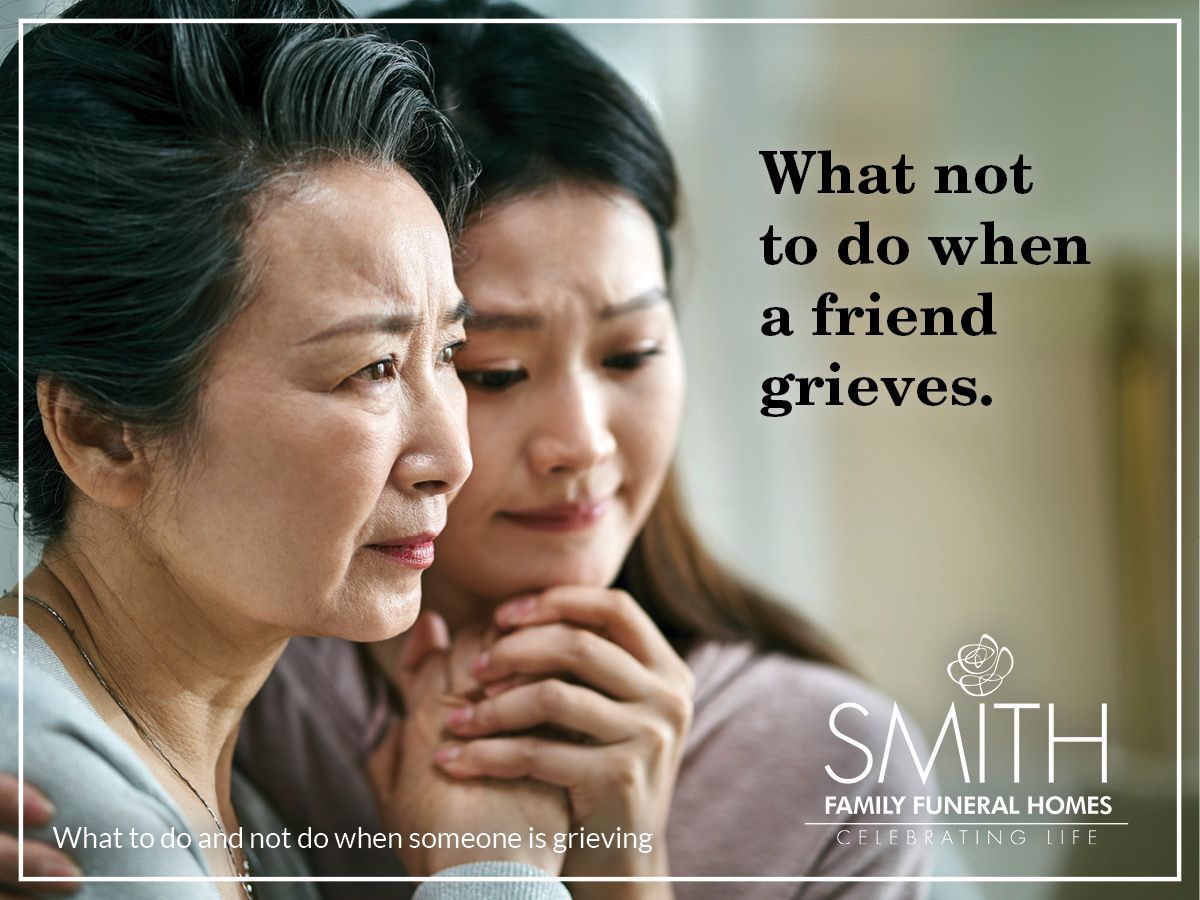
When someone passes, what should you say to the people they leave behind? It’s a tricky question. You want to be respectful and acknowledge their loss. You don’t want to diminish their grief, but you also don’t want to say something that may upset them when they’re already experiencing many emotions. When you greet a family member at their loved one’s funeral, what's the best thing to say?
What to Say to Someone at a Funeral
1. “I’m sorry for your loss.”
This phrase is one that’s frequently said to the family of the deceased, and if you’re not sure of anything in particular to say, it’s a good idea to say it. You may only have a few moments to speak to family members, and you don’t want to overwhelm them by talking too much. To simply say, “I’m so sorry for your loss” is fine. It’s to the point while still conveying how you feel.
2. Offer specific help.
When a loved one passes, day-to-day life can go by the wayside. It’s easy to let the little things fall through the cracks when you’re dealing with the weight of grief. But for many people, forgetting the small things can create big problems. Those family members may have their own kids to take care of and their own households to maintain. Offering help of any kind is a nice sentiment, but it can be overwhelming for someone in mourning to be able to verbalize what they need. Try to come up with ways to help before you speak with them. Maybe you could organize picking their kids up from school and taking them to soccer practice. Or you could offer to make a few easy-to-reheat dinners for the week.
However, it’s essential not to be pushy. Your heart is in the right place, but some people may be hesitant to accept help right away. If they say that they don’t need help, don’t try to tell them that they do. Instead, make sure that they have your phone number and tell them that your offer stands for whenever or if ever they want your assistance.
3. Tell them what you’ll miss about the decedent.
It’s enough to say, “They were a good person.” But when you talk to a family member of the decedent, try to be more specific. What is it that made them a good person? What did you love about them? It can help a family member to know just how loved their loved one was. So, tell them what made them special to you. It could be something silly, especially if they were known for their sense of humor, or it could be something more serious. What matters is that it comes from the heart.
4. Tell a short story that may make them smile.
You may not have much time to talk to the deceased's family at a funeral service, but you may have more time at a visitation or reception. When you have the opportunity to speak more, try sharing a story. These family members are experiencing many emotions, so try to keep the story light. Do your best to keep it brief as well, as the family will likely have many more people to talk to. But ultimately, pick a story that will make them smile and remember how unique their loved one was.
What Not to Say at a Funeral
1. “They’re in a better place.”
While the intention behind the words is undoubtedly kind, this particular platitude can be perceived as somewhat of an insult or cause distress in other ways. For someone going through the pain of loss, there is no “better place” for their loved one to be than here on Earth with them. In time, they may be comforted by the idea of their loved one living on in an idyllic place, but while the pain is still fresh, it’s best not to make this assertion. Additionally, a person experiencing grief is likely thinking, feeling, and acting differently than they normally do; even if you think this person would usually take such a comment as a comfort, be cautious about using it at the funeral unless they indicated that they already hold this belief.
When you talk about the decedent at their funeral, you should generally keep the focus on that person’s life, not their death. The person you’re speaking to knows that they’re at their loved one’s funeral. They don’t need to be reminded by being told that their loved one is no longer with them physically.
2. “If there’s anything I can do, let me know.”
It comes from a good place to offer help of any kind, but it can be a lot to ask someone to come up with a list of ways for you to help them when they’re put on the spot. They’re likely overwhelmed by their emotions. There may be many things that they need help with, but they may struggle to think of them in the moment. They also may assume that what you’re saying is a platitude and think you don’t actually mean what you’re saying. It’s better to offer specific ways to help. Alternatively, you can reach out after the funeral when they’re a little less overwhelmed to ask how to help.
3. “I know how you feel.”
The reality is that you don’t know how they feel. You may think that you do. Maybe you lost a parent, and they just lost a parent, so you think you know what it feels like to lose a parent. But every person is different, which makes every loss different. Just because you felt one way after losing someone important to you doesn’t mean that they will experience the same emotions.
It’s also better not to focus on you when you’re talking to someone who just lost a loved one. Trying to relate to someone who lost someone important to them may seem like a good way to commiserate together. But it may just make the person feel like you’re trying to keep the focus on you rather than them. Keep the focus on the person who passed and the person you’re speaking to.
4. “Time heals all wounds.”
This platitude is another one that seems kind, but it may not come across that way. Although you’re trying to say that how they’re feeling will get better in time, they don’t really need to be reminded about a future without their loved one right now. Saying that time heals all wounds can diminish the grief that someone is feeling. They also may take it to mean that you’re saying that they will forget their loved one in time, which is a fear that many people have after the death of a loved one. It’s better to help them remember all the things that made their loved one special rather than convince them it’s better to forget.
Talking to someone at a funeral can feel like you’re navigating uncharted waters. What’s the right move? What’s the wrong one? The most important thing to remember is to speak from the heart. Remember that it’s not about you. It’s about being there for the people who just lost someone important to them. Offer help and condolences, and remember that the people you’re speaking to will appreciate your continued support during this difficult time, even after the funeral ends. Ultimately, the person you’re speaking with will talk to many people throughout the day, and they’ll likely forget exactly what you said when the funeral comes to an end. But what they won’t forget is how you made them feel. So, don’t worry about saying the exact right thing. Instead, just focus on being supportive, kind, and sympathetic.
Smith Family Funeral Homes provides quality funeral, memorial and cremation services to the families of Central Arkansas. Their six locations can be found in Little Rock, North Little Rock, Westbrook, Sherwood, Benton and Arkadelphia. With a privately-owned crematory operated by licensed professionals, Smith Family Funeral Homes can guarantee their high standard of care throughout the cremation process. To learn more, visit smithfamilycares.com.












